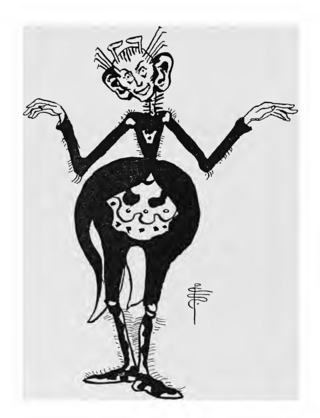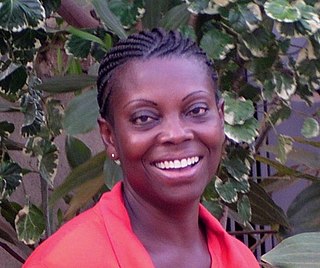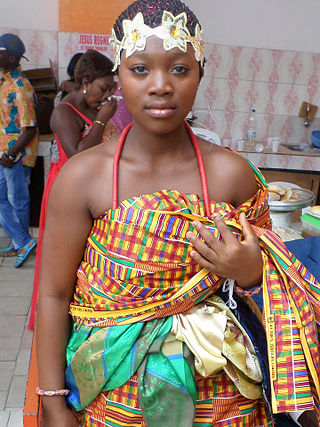
Anansi or Ananse is an Akan folktale character associated with stories, wisdom, knowledge, and trickery, most commonly depicted as a spider, in Akan folklore. Taking the role of a trickster, he is also one of the most important characters of West African, African American and West Indian folklore. Originating in Ghana, these spider tales were spread to the Americas via the Atlantic slave trade.
The Akan people are a Kwa group living primarily in present-day Ghana and in parts of Ivory Coast and Togo in West Africa. The Akan speak languages within the Central Tano branch of the Potou–Tano subfamily of the Niger–Congo family. Subgroups of the Akan people include: the Agona, Akuapem, Akwamu, Akyem, Anyi, Ashanti, Baoulé, Bono, Chakosi, Fante, Kwahu, Sefwi, Wassa, Ahanta, Denkyira and Nzema, among others. The Akan subgroups all have cultural attributes in common; most notably the tracing of royal matrilineal descent in the inheritance of property, and for succession to high political office. All Akans are considered royals in status, but not all are in royal succession or hold titles.

Amma Darko is a Ghanaian novelist. She won The Golden Baobab Prize for one of her novels. She has published seven novels in total.

The Bono, also called the Brong and the Abron, are an Akan people of West Africa. Bonos are normally tagged Akan piesie or Akandifo of which Akan is a derivative name. Bono is the genesis and cradle of Akans. Bono is one of the largest ethnic group of Akan and are matrilineal people. Bono people speak the Bono Twi. The name Twi is a derivative of a Bono King Nana Twi
Monotheism—the belief that there is only one deity—is the focus of the Abrahamic religions, which like-mindedly conceive God as the all-powerful and all-knowing deity from whom Abraham received a divine revelation, according to their respective narratives. The most prominent Abrahamic religions are Judaism, Christianity, and Islam. They, alongside Samaritanism, Druzism, the Baháʼí Faith, and Rastafari, all share a common core foundation in the form of worshipping Abraham's God, who is identified as Yahweh in Hebrew and called Allah in Arabic. Likewise, the Abrahamic religions share similar features distinguishing them from other categories of religions:

Winti is an Afro-Surinamese traditional religion that originated in Suriname. It is a syncretization of the different African religious beliefs and practices brought in mainly by enslaved Akan, Fon and Kongo people during the Dutch slave trade. The religion has no written sources, nor a central authority. The term is also used for all supernatural beings or spirits (Wintis) created by Anana, the creator of the universe.

Religion in Ivory Coast is diverse, with no particular religion representing the majority of the population. According to the 2021 census, Islam is professed by 42.5% of the total population, while adherents of Christianity represented 39.8% of the population. In addition, 12.6% of Ivorians reported to be non-religious and 2.2% claimed to follow Animism or traditional faiths. Between the 2014 and 2021 censuses, the share of Christians increased from 33.9 to 39.8 percent, while the share of Muslims declined from 42.9 to 42.5 percent of the total population.

Asase Ya/Afua is the Akan goddess of fertility, love, procreation, peace, truth and the dry and lush earth in Ghana and Ivory Coast. She is also Mother of the Dead known as Mother Earth or Aberewaa.
The Obolo people, also known as the Andoni or Doni, is an ethnic group in the Niger Delta region of Nigeria. Obolo people are of Ijaw ansestry and are primarily found in Rivers State and Akwa Ibom State. They are also present in the states of Cross River, Abia, and Enugu.

Nyambe is the Supreme God, Sky Father, and God of the Sun across numerous traditional Bantu religions.

Akan religion comprises the traditional beliefs and religious practices of the Akan people of Ghana and eastern Ivory Coast. Akan religion is referred to as Akom. Although most Akan people have identified as Christians since the early 20th century, Akan religion remains practiced by some and is often syncretized with Christianity. The Akan have many subgroups, so the religion varies greatly by region and subgroup. Similar to other traditional religions of West and Central Africa such as West African Vodun, Yoruba religion, or Odinani, Akan cosmology consists of a senior god who generally does not interact with humans and many gods who assist humans.
Jok is a term for a class of spirits in the traditional belief system of the Acholi people of Uganda and South Sudan. Jok are believed to be the cause of illness, misfortune, and death, as well as the source of power, protection, and prosperity. Traditional healers first identify the Jok in question and then make an appropriate sacrifice and ceremony to counter them. Alternatively if such an approach was unsuccessful the person possessed by the Jok could go through a series of rituals to gain some level of control over the Jok and then themselves become ajakwa. Jok can be ancestral or non-ancestral, and can be attached to specific clans, chiefdoms, natural phenomena, or historical events. Jok was believed to be the supreme god, who is the creator and ruler of the universe.
Medefaidrin (Medefidrin), or Obɛri Ɔkaimɛ, is a constructed language and script created as a Christian sacred language by an Ibibio congregation in 1930s Nigeria. It has its roots in glossolalia.
Bob Johnson, also known as The Original Bob, was a Ghanaian comedian who started the one-man show to concert party.
Abassi is the supreme creator god of the Efik, Ibibio, and Annang people of Nigeria. The depiction of Abassi in Efik and Annang traditions is influenced by Ibibio mythology since the two groups used to be part of the Ibibio before they migrated to different parts of southeast Nigeria and formed their own societies.
Bemba is the creator god in the traditional religion of the Bambara people of Mali. The name is used to refer to Bemba, who is portrayed as a god consisting of four distinct beings and is sometimes used to refer to one of its members, Pemba. Although Bemba is often referred to as male, the union of these four beings as Bemba is hermaphroditic, with the male aspects represented by Pemba and Ndomadyiri, while the female aspects are represented by Nyale and Faro.
Nhialic is the supreme creator god of the Dinka pantheon, whose people now dwell in South Sudan. When used in the context of Dinka language, the term also can refer to the entirety of the gods within the Dinka pantheon. In some accounts, Nhialic is also known as Deng Dit.
Tano (Tanoɛ), whose true name is Ta Kora and is known as Tando to the Fante is the Abosom of war and strife in Akan mythology and Abosom of Thunder and Lightning in the Asante mythology of Ghana as well as the Agni mythology of the Ivory Coast. He represents the Tano River, which is located in Ghana. He is regarded as the highest atano, or Tano abosom in Akan mythology.
Owuo is the abosom of Death in the Asante and Akan mythology of West Ghana and the Ewe, specifically the Krachi tribe of East Ghana and Togo. He is represented with the Adinkra symbol of a ladder. It is said that he was created by Odomankoma just so he could kill humans and possibly other deities, such as Odomankoma himself. He signifies the termination of the creative process in the world, a reference to him killing Odomankoma, the Great Creator









